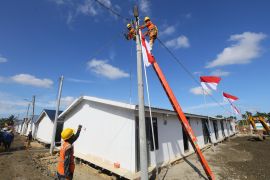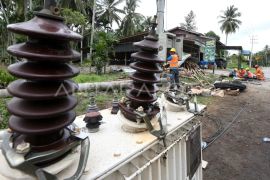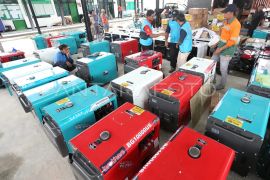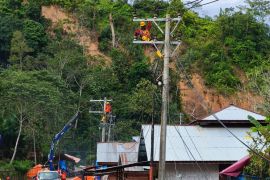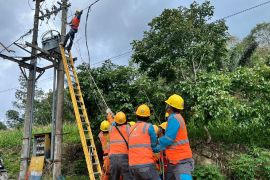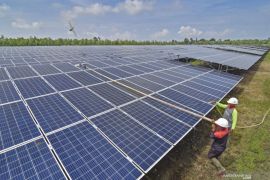PLN president director Dahlan Iskan has accused industrialists of being spoiled and not using common sense for refusing the new electricity basic tariff. "They keep asking for being pampered and sung lullabies," Iskan was quoted as saying in a press release made available to media by PLN on Saturday.
The big industrialists, according to Iskan, just want to have their own industries that alive and let the electricity industry in a distress, adding that the other similar industries have paid electricity tariff on normal rates, without asking for a special treatment such as ceiling for any hike PLN implemented.
"If they`ve argued the lifting of the ceiling would diminish their competitive edges, then why those similar industries that have paid the normal rates in reality not beaten in competition?" Iskan said.
Dahlan went on to say that if the pampering of the industrialists is not opposed, then the Indonesian people would never be able to progress. That is because if the electricity industry could not progress then eventually the entire economy would be in difficulty.
He added that the industrialists opposing the new tariff policy had also been voicing an impression that the entire industrial sector as a whole would be affected by the hike ceiling lifting.
The PLN chief made his statement just two days after Indonesian Employers Association (Apindo) chairperson Sofjan Wanandi said last Thursday the industrial sector was considering to switch business to importing goods from overseas instead of producing them locally due to the new tariff policy.
Wanandi said that producing goods domestically had become costlier due to the high cost of electricity if the 18 percent ceiling on tariff hike dismantled. The average increase for industrial sector could therefore be as high as 40 percent.
However, PLN Risk Management chief Murtaqi Syamsuddin denied the newly introduced tariff scheme was a hike after all, and that the past fixing of the 18 percent hike ceiling for the industry had caused tariff disparities. "Industrial earlier users have paid less compared to the new customers," he said.
Syamsuddin also said that the new rates that have been effective since January 1, 2011 were based on Energy and Mineral Resources Minister`s Regulation Number 7/2010 on electricity tariff provided by PLN.
Smaller industries
In response to Iskan`s statement that Indonesian industrialists had sought for being pampered and sung lullabies, Wanandi brushed that idea aside, saying that Iskan had misunderstood what his side had been voicing about, in an interview with ANTARA last Saturday afternoon.
Wanandi added he has refused the new tariff as the move has been threatening the smaller industries. If the hike were not rescinded, those smaller industries might not have other alternative but laying off workers something no one likes to hear about.
Saying he was in astonishment over the hike, Wanandi questioned the real argument for the hike as the majority of electricity users were the household category, not the industry one. "Why PLN keeps pressing the industry, a sector which has created a big employment for the people?"
He asked PLN to contemplate on the hike issue as the acute problems it had been facing more had something to do with the past erroneous policies taken. PLN has used the costlier fuel-fired generators instead of coal- or gas-fired ones that putting more salt to the wounds when world crude oil prices are skyrocketing as the case now.
The industrial sector is hoping and keeps expecting the days when PLN could make a reality of its promises on enhancing using gas and coal so that while being able to provide more electricity supplies it could also keep reducing production costs, Wanandi pointed out.
Wanandi also cited an apprehension over the hike issue when it was linked to the ever fiercer competition in global markets. "I think in this era of competition with China and Taiwan and the others, it would certainly affect Indonesian economy`s competitiveness," he said.
Indonesian Footwear Association (Aprisindo) chairperson Eddy Widjanarko has also put forward a grievances over the hike, revealing that rates hike had forced foreign companies to reconsider, or at least put on hold, their plans to relocate here from Taiwan and China.
"The investors will wait until there is certainty on the electricity tariff," Widjanarko said recently. Aprisindo had earlier announced the domestic footwear industry had got a pledge for an investment of 550 million US dollar from six Taiwanese and South Korean footwear manufacturers that were to relocate plants from China and Vietnam. The relocation plan was prompted by higher labor costs and raw materials there.
In all, six manufacturers are outsourcing a significant amount of shoes and products for world famous brands, including Nike, Reebok and Geox.
"In January 2011, Adidas is targeting to produce 1.2 million pairs of shoes per month," he said, adding that more footwear manufacturers are expected to relocate here over the next few years, but that current electricity tariff hiking may hamper the investment wave.
Nevertheless, the last nail on the coffin of the dispute was struck by Energy and Natural Resources Minister Darwin Saleh who had said the plan for the 18 percent ceiling dismantling was shelved because there had not yet an agreement on it reached between the government and the House of Representatives. (*)
Reporter: By Vicki Febrianto
Editor: Kunto Wibisono
Copyright © ANTARA 2011

